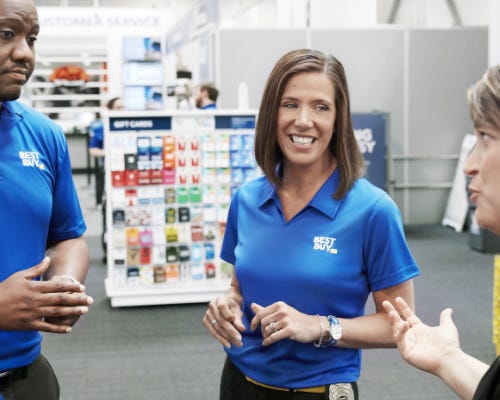
5 Fave Innovators of 2019
It’s that time of year.
The time when we look back and take stock, and look forward and plan. So, it is in that spirit that I offer you my completely subjective list of the top 5 innovators of 2019.
Here’s the “criteria” for making the list:
- Received media coverage (including traditional media, blogs, newsletters) BUT not so much that they’re amongst the “usual suspects” (e.g. FAANG CEOs)
- Did, or currently doing, something different that creates value (i.e. innovation)
- Exemplified the characteristics of an innovator including, but not limited to, courage, creativity, customer-centricity, perseverance, humility, and humor.
Without further ado, here’s my Top 5 Innovators:

Corie Barry, CEO of Best Buy
for exemplifying resilience and loyalty throughout her career
According to this fascinating Fortune article, early in her career, Corie Barry received a performance review that labeled her as a “risk to the organization.” Most people would take that as a sign that their days were numbered but Barry looked for the “nugget of truth” that contained the “things I need to work on” and “buckled down,” even creating her own development plan.
In 2012, when Best Buy seemed to be on its death bed, Barry buckled down again, choosing to stay with the retailer.
“If your purpose is stewardship, and leaving when things are bad is the ultimate crime,” she recalled.
Her perseverance, resilience, and loyalty paid off when, in June, she was named CEO of Best Buy and, at 44, the youngest female CEO in the Fortune 500. In September, she laid out a plan to Wall Street to grow her new charge from $43B in revenue to $50B by 2025.
That type of growth may seem like a long shot given all the talk of a “retail apocalypse,” but if her past is any indication, I wouldn’t doubt her for a second

Alex West Steinman, Bethany Iverson, Liz Geil, and Errin Farrell, Co-Founders of The Coven
for bringing inclusivity and diversity to a place where it’s not often found
I grew up in the Midwest (Cleveland, to be specific) and while I will be eternally grateful for that fact and will defend my Ohio roots (and sports teams) to the day I die, I will also be the first to admit that it’s not perfect.
And one of the Midwest’s many imperfections is it’s utter lack of diversity. That’s why Alex West Steinman makes this list.
In 2017, along with three other co-founders, Alex founded The Coven, a co-working space in Minneapolis. But The Coven is more than a local WeWork, it’s mission is to “economically empower women by providing safe, accessible space for personal and professional transformation.”
The Coven’s business model reflects its mission — for every 5 memberships purchased, the business gives one to a member of the community that couldn’t afford it, “prioritizing people of color, folks from the LGBTQ community, those who are differently abled, immigrants, and veterans.”
Now boasting 2 locations, 600+ members (including 140 at no cost), The Coven is making important progress in bringing diversity and inclusivity to innovation, entrepreneurship, and its Midwest community

Marcela Sappone and Jessica Beck, Co-founders of Hello Alfred
for the courage to go against the grain and do the right thing
Hardly a week passes when we don’t hear of the legal, economic, and ethical problems of the giants of the Sharing Economy choosing to designate their labor forces as contractors instead of employees.
Every company except for one.
When Marcel Sappone and Jessica Beck founded Hello Alfred while getting their MBAs at Harvard Business School, they were the Alfreds — running errands, doing odd-jobs, and responding to requests at all hours of the day and night. And when they had proof of concept, they began to design a sustainable and scalable business model. One with W2 employees.
Yes, they met resistance from investors, even being turned down by some because of their choice but they remained committed to their model because they believed that the success of their business required relationships, not just transactions,
“There should not be a disconnect between the success of a company and the success of its workers. We believe treating our employees as our primary customer is how we can best satisfy our end users.”
Sappone lays out the full argument in this 2015 Quartz article and the benefit of her stick-to-it-tiveness is undeniable. Now in 20+ cities and with 200+ employees, Hello Alfred raised a $40M Series B round in 2018, giving it the highest valuation in its competitive set (e.g. Task Rabbit and Nextdoor)

Jean Brownhill, Co-founder of Sweeten
for solving two problems with one solution
For two years, we’ve need to repaint our house. We originally contacted the painter who painted the house when it was built in 2013. One year and no progress but lots of sketchy stories later, we gave up and called a 2nd painter. He looked over the job and called us back to say he wasn’t comfortable doing it because he was friends with the original painter. He referred us to a 3rd painter who also came to scope the work, only to engage in absurdly belligerent text messaging when trying to nail down the logistics of the job. We talked to a 4th painter in summer 2019 and he agreed to do the work in spring 2020.
Because of this experience, and far too many others like it, Jean Brownhill and the company she founded, Sweeten, are on my list of 2019 Faves.
An architect by training, Brownhill founded the company after her own frustrating experience with a contractor. The concept was simple — Sweeten would match home owners with renovation projects to vetted general contractors and would take care of all of the back-office work that customer service, documentation, and marketing.
Sweeten’s projects have grown from an average of $2000 to over $100,000 in the past eight years and the company now boasts $1B in construction business and 1,5000 vetted contractors in it’s pipeline, according to an article in Architectural Digest.
This success has led to the creation of Sweeten Accelerator for Women (SAW) and initiative to actively recruit female general contractors into the platform and redesign the matching algorithm to allow home owners to select the gender of their contractors.
In an industry in which women comprise only 3% of the workforce and make $0.91 cents on the dollar compared to their male counterparts (interestingly, one of the smallest gender pay gaps of any industry), the effort simply makes sense,
“A shift in the professional paradigm for general contractors would mean more opportunities for women to enjoy business ownership and greater wealth, and would diversify the client experience in important ways.”

Angela Ahrendts, former SVP retail at Apple
for following her heart
Much has been written about Angela Ahrendts — her childhood in Indiana, her education at Ball State, her early career in fashion in NYC through to her triumphant reign as CEO of Burberry, and her “shocking” move to tech when she joined Apple.
Yes, it is all amazing.
So was her decision to walk away from her role at Apple, where she was the company’s highest paid exec, earning 2x the salary of the CEO, and the company’s only female SVP. She walked away without apology or explanation.
Testament to the fact that, sometimes, leaving something is just as powerful and inspiring as starting something.
Hope you enjoyed my Top 5!
Who made your list? Who did I miss?